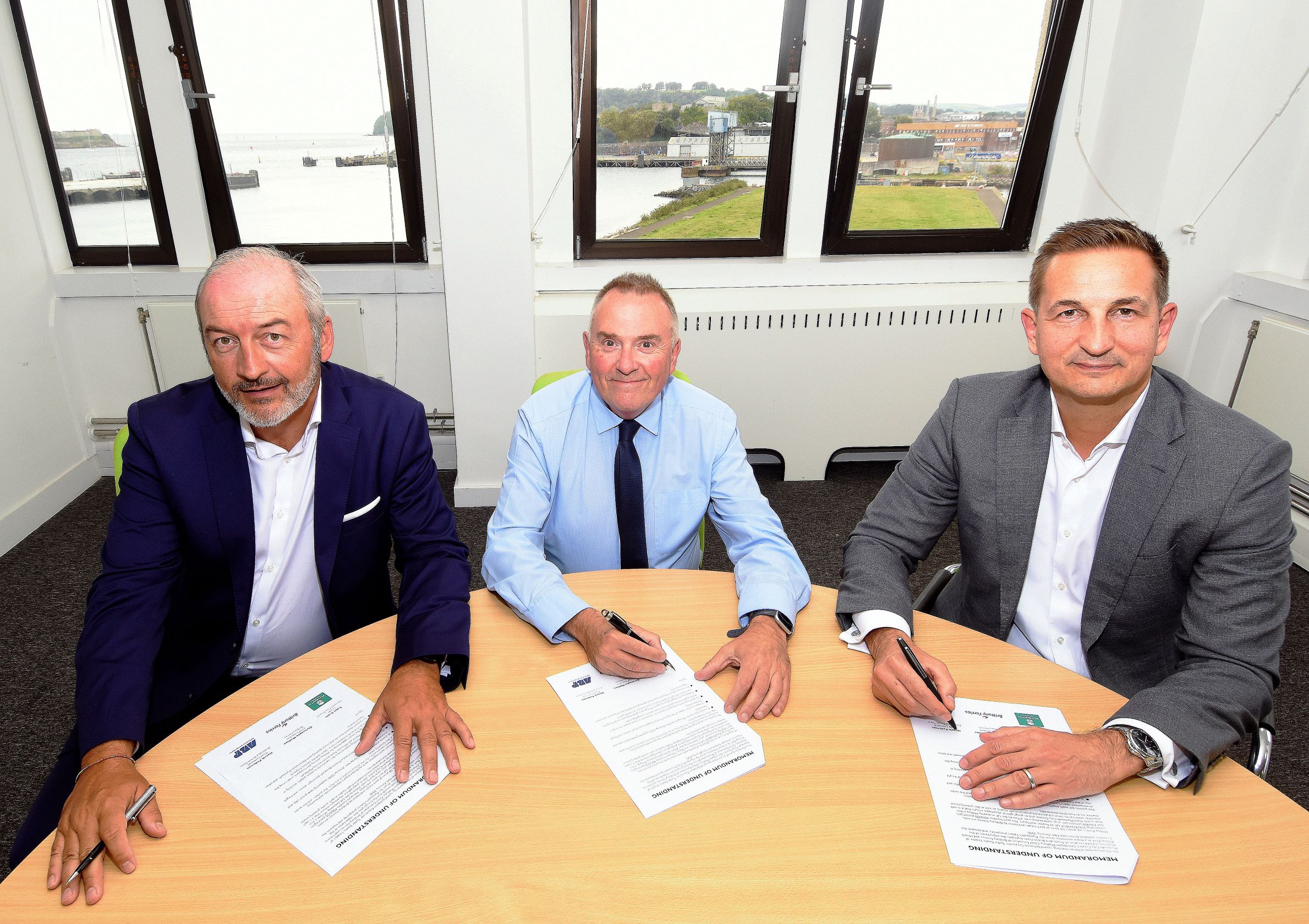Image caption: (L-R) Christophe Mathieu, Chief Executive of Brittany Ferries, Councillor Tudor Evans, Leader of Plymouth City Council, and Henrik Pedersen, Chief Executive of Associated British Ports (ABP)
Associated British Ports (ABP), Plymouth City Council and Brittany Ferries have pledged to work together to support the docks to grow and to work towards Net Zero by signing a Memorandum of Understanding (MOU).
The memorandum was signed yesterday (17 August) by Councillor Tudor Evans, Leader of Plymouth City Council, Christophe Mathieu, Chief Executive of Brittany Ferries and Henrik Pedersen, Chief Executive of ABP and commits all partners to working together to ensure Millbay Docks at the Port of Plymouth, which is owned and operated by ABP, enjoys a sustained era of clean, green and good growth, with investment to future proof facilities at the docks for years to come.
The move will support Millbay Docks as a key economic driver for Plymouth and work towards the Council’s ambition to become Net Zero by 2030.
It came as the city welcomed thousands of visitors for the British Firework Championships, with Brittany Ferries marking its 50th year of service by becoming a major partner in the event.
Millbay Docks, owned and operated by ABP, covers 50 acres of port estate and is home to Brittany Ferries services, connecting the South West to France and Spain. It handles 400,000 passengers and 150,000 vehicles per year, as well as 80,000 tonnes of cargo each year, contributing to over £95m to the UK economy.
Millbay Docks is less than a mile from the city centre and its geographical advantages ensure that it is well places to continue to serve established European trade routes as well as the growing cruise market via its two dedicated berths.
The three parties will work together to bring forward improvements and business development opportunities, for the mutual benefit of the docks, the parties and the wider port and city of Plymouth, in the following areas:
- A shared ambition for Millbay Docks to be Net Zero by 2030 supporting new green jobs and investment
- To maximise the impact of planned capital projects, including quayside passenger access and freight improvements
- To identify grant funding opportunities for investment in shore power, assisting in reducing greenhouse gas emissions from vessels visiting the docks
- To develop the freight opportunity for Millbay utilising the Freeport, underlining the importance of trade between France, Spain and the United Kingdom
- To increase inbound tourism and cruise working with Destination Plymouth and other regional bodies.
Council leader Tudor Evans OBE said:
“Port cities such as Plymouth have the advantage when it comes to working towards net zero. Transporting goods by ship is one of the cleanest ways of getting products from A to B. Millbay Docks has huge potential to be a major player for new freight opportunities, particularly as part of our Freeport status.
“We’re really keen to work closely with them to explore all avenues that create new jobs and are particularly excited about the prospect of green jobs and marine innovation that Plymouth leads the field in. We need to do more and we can do more to keep Plymouth ahead of the competition. That’s what this Memorandum is about.”
Associated British Ports’ Chief Executive, Henrik Pedersen, said:
“This year has seen the launch of our wide-ranging new sustainability strategy, ‘Ready for Tomorrow’, which outlines our plan to invest £2 billion in decarbonising our own port operations by 2040, and in major infrastructure projects to enable the wider UK energy transition. If we are going to make Net Zero a reality, it is essential there is a partnership approach, which is why we are delighted to be working with Plymouth City Council and Brittany Ferries to support greener growth for Millbay Docks and Plymouth more broadly.”
“We are delighted to support this strong message of collaboration and intent with the city and Plymouth Port,” added Christophe Mathieu CEO Brittany Ferries. “We have proudly operated from Plymouth since the company’s inception in 1973. Fifty years on we are looking forward to a shared future built on economic growth, more cross-border trade and sustainable operations at sea and while in port.”


